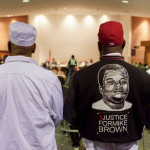Starting with the story of a Georgia teenager who spent five days in jail for an illegal left-hand turn, the CBS News “Market Watch” program is outlining how the civil-case to jail-case route actually happens. It turns out that the 19-year-old driver could not pay $838 quickly enough. Eventually, a lawsuit over the case was reportedly settled for $70,000, but CBS says the practice remains common nationally.
Of course, the poster child for the practice, and what it can trigger, is Ferguson, MO, where the city’s finance director famously offered advice to the police chief in a March 2010 letter, warning that “unless ticket writing ramps up significantly before the end of the year,” the city faced a budget shortfall, said Norquist. He added that a state lawmaker had told him police officers would get little notices along with their paychecks, warning: “If we don’t get more tickets, there won’t be pay increases.”
Read about the new American debtor’s prison here: How you could go to debtors’ prison in the U.S.
